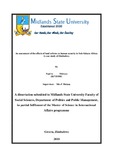Please use this identifier to cite or link to this item:
https://cris.library.msu.ac.zw//handle/11408/4057| Title: | An assessment of the effects of land reform on human security in Sub-Sahara Africa: a case study of Zimbabwe. | Authors: | Makaya, Tapiwa | Keywords: | effects of land reform human security |
Issue Date: | 2018 | Publisher: | Midlands State University | Abstract: | The aim of the research was to assess the effects of land reform on human security in Sub-Sahara Africa. The survey was guided by research objectives which were firstly, to explain the concept of land reform in Sub-Sahara Africa. Secondly, to assess the effects of land reform on human security in Sub-Sahara Africa. Thirdly, to examine the dynamics surrounding land reform on human security in Sub-Sahara Africa. Lastly, to proffer scholarly recommendations on workable plan of land reform in Sub-Sahara Africa. The survey adopted a positivism philosophical approach since matters of objectivity were of paramount significance. A qualitative approach was used as the orientation for research methodology in order to facilitate exploration of subjective meaning, experiences and interpretations of land reform. A descriptive research design was then used however; it was triangulation system since qualitative and quantitative methods were used for data analysis. Convenience sampling methods was used to select a sample from the target population. The research found out that land reform can be a drive to towards poverty alleviation and economic growth. However, if not properly conducted can negatively impact on human security. Land reform can result in decline of agriculture production thereby affecting food security which guarantees human security. Land reform can result in human wildlife conflict, discrimination, displacement of farm workers, and environmental degradation. Emerging dynamics of land reform like subletting of land and emerging of class dynamics can all be a result of land reform. The study recommends that there must a land advisory board which should assist with strategies for conducting sustainable land reform program which gives a holistic approach to human security needs. Further, it is recommended that Sub-Sahara Africa countries should secure international support and finance the land reform to facilitate compensation of displaced farmers as well as supporting incoming new farmers. Lastly, land reform in Sub-Sahara Africa must ensure all eligible applicants are considered without matters of race, gender, religion, ethnicity and political affiliations. | URI: | http://hdl.handle.net/11408/4057 |
| Appears in Collections: | Master of Science in International Affairs Degree |
Files in This Item:
| File | Description | Size | Format | |
|---|---|---|---|---|
| Tapiwa Makaya MSIA Complete.pdf | Full Text | 1.31 MB | Adobe PDF |  View/Open |
Page view(s)
132
checked on Apr 4, 2025
Download(s)
1,596
checked on Apr 4, 2025
Google ScholarTM
Check
Items in MSUIR are protected by copyright, with all rights reserved, unless otherwise indicated.



